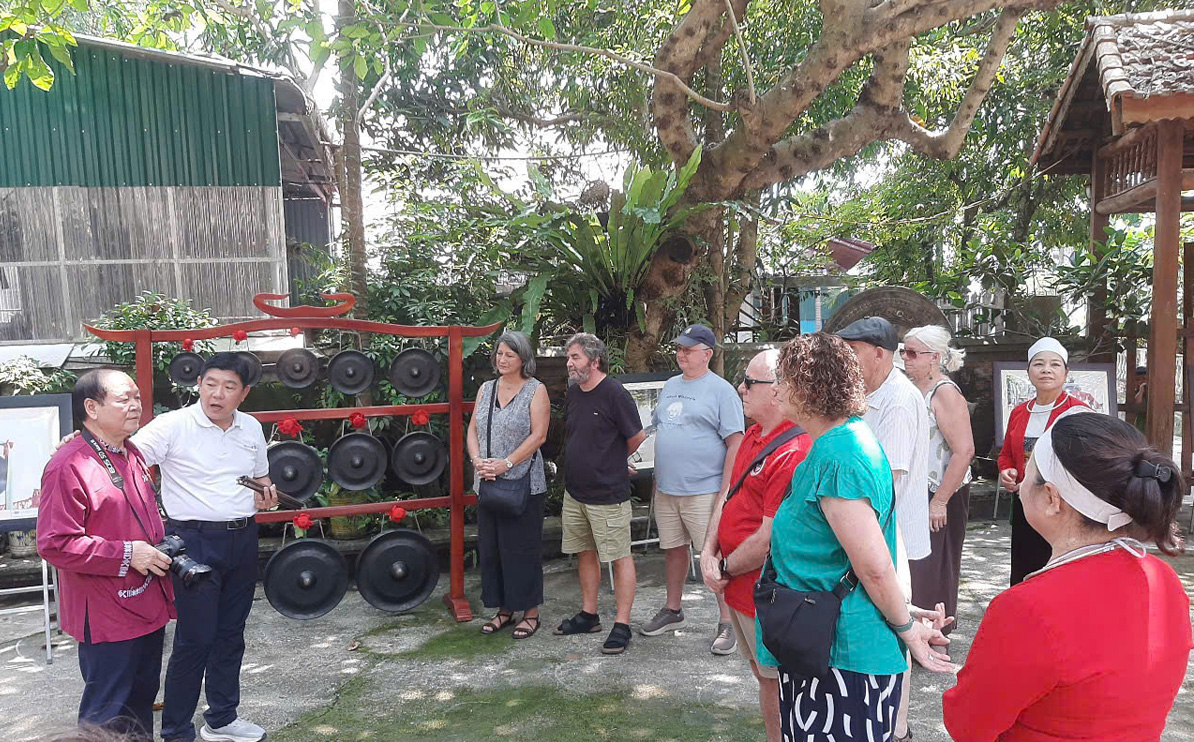



Meritorious Artisan Bui Thanh Binh (first, left), Director of the Muong Cultural Heritage Museum tells foreign visitors about the Gong culture in the spiritual life of Muong people.
Continuing the legacy of ancient cultural values
After hearing friends speak highly of the Muong ethnic artifact collection curated by Meritorious Artisan Bui Thanh Binh, and Le Tat Dat from Hai Phong, along with his family, visited Hoa Binh to witness the valuable collection firsthand. He was impressed by the richness of the artifacts and the museum's atmosphere. Listening to Meritorious Artisan Binh’s sharing, he and his family became even more captivated by the experience.
Located in Group 6, Thai Binh ward of Hoa Binh city, the Muong Cultural Heritage Museum is a privately owned establishment that was granted operation permission by the Hoa Binh provincial People's Committee. The museum, directed by Meritorious Artisan Binh, houses nearly 6,000 items, including over 100 sets of bronze gongs, alongside thousands of other artifacts meticulously arranged to illustrate the development phases of Muong culture. Established in 2014 and officially opened in 2015, the museum comprises six main houses designed to showcase artifacts and traditional performances of Muong rituals, including gong ceremonies. It is not only a place to learn about the lifestyle, customs, and traditions of the Muong people but also a sanctuary for preserving traditional values such as music, folk songs, costumes, and tools used in Muong agricultural practices.
Since its inception, the museum has attracted numerous visitors, both domestic and international, interested in studying Muong culture. Dat said that in Vietnam, there are very few privately owned museums created by local ethnic groups. This museum impresses me deeply, as it was built by the people of Hoa Binh, who have a profound understanding of their culture and heritage. "Visiting and listening to Meritorious Artisan Binh, I felt like this museum is a bridge connecting the past and the present, bringing visitors back to the sounds of gongs in the ancient land of Hoa Binh,” stated Dat.
One of the museum’s strengths is its ability to offer visitors an immersive experience of Muong culture. Visitors not only tour the exhibits but also have the opportunity to participate in hands-on cultural activities, such as weaving traditional fabrics or joining Muong traditional festivals.
Cultural identity lays foundation for sustainable tourism development
Outlining the future direction of the museum, Meritorious Artisan Binh underlined that sustainable tourism development through minimising negative environmental impacts is always a top priority for the museum. All tourism activities here are organised in a way that does not harm the natural landscapes or ecosystems. Visitors are encouraged to participate in environmental protection activities, such as planting trees and cleaning up the surrounding areas, he added.
Vietnam's tourism development strategy up to 2020, with a vision for 2030, emphasises that sustainable tourism should be closely linked to preserving and promoting ethnic cultural values, safeguarding landscapes, protecting the environment, and ensuring national security and social order.
Hoa Binh, a mountainous province home to many ethnic minorities, with the Muong people being the majority, sees sustainable tourism as a means not only to preserve cultural heritage but also to contribute to the province's economic growth. The Muong Cultural Heritage Museum can be seen as a model of sustainable tourism, effectively integrating the conservation of cultural heritage with local economic development. Through activities at the museum aimed at attracting both domestic and international visitors, the tourism brand of Hoa Binh is enhanced. Local handicrafts are displayed and sold at the museum, offering economic opportunities to the community. Additionally, improving tourism service quality, creating distinctive tourism products, and maintaining strong ties with the community are critical factors in boosting sustainable tourism growth.